I think everyone who knows westerns, knows Gunsmoke. It was easily the king of western television shows and could possibly be the king of all American tv shows. It lasted for 20 seasons, making it the longest running primetime drama in television history until Law & Order tied with it’s own twenty seasons. However, because of Gunsmoke’s much longer seasons, often 39 episodes, it has nearly 200 more episodes than Law & Order. In fact, the Simpsons, which is the longest running scripted weekly TV show, didn’t produce more shows than Gunsmoke’s 635 until it’s 29th season. That shows you just how stalwart the folks of Dodge City, Kansas really are.
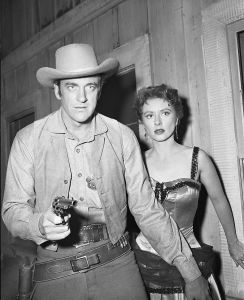
The show started as a half-hour program but after the 6th season was extended to an hour, and after the 8th season it went from black and white to color. But before it ever went out over the television airwaves it first went across the wires as a radio show started in 1952. Due to the show’s popularity, CBS determined to make a TV adaptation, staying with the same tone and purpose, but recasting with faces for TV (and in the case of the character Matt Dillon, a body for television, also).
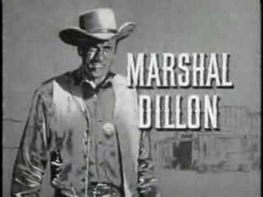 In 1955 two new shows were put on the air that shaped the future of television in America for some time to come. Those shows were The Life and Legend of Wyatt Earp and Gunsmoke. One was directly about Wyatt Earp, obviously, and the other one was in sort of an indirect, unintentional way. Gunsmoke never set out to be a Wyatt Earp show but with a changed name, instead it sort of embodied the story of the west, in which Wyatt Earp was integral, as well as being front and center in America’s collective conscience at the time. Matt Dillon, in essence, embodied the spirit of the tough American lawman that faced death in the form of rowdies coming-and-going at will. Matt Dillon embodied the men like Wyatt Earp, Bat Masterson, Bill Tilghman, and others who patrolled the streets of Dodge City during its wild-and-wooly days.
In 1955 two new shows were put on the air that shaped the future of television in America for some time to come. Those shows were The Life and Legend of Wyatt Earp and Gunsmoke. One was directly about Wyatt Earp, obviously, and the other one was in sort of an indirect, unintentional way. Gunsmoke never set out to be a Wyatt Earp show but with a changed name, instead it sort of embodied the story of the west, in which Wyatt Earp was integral, as well as being front and center in America’s collective conscience at the time. Matt Dillon, in essence, embodied the spirit of the tough American lawman that faced death in the form of rowdies coming-and-going at will. Matt Dillon embodied the men like Wyatt Earp, Bat Masterson, Bill Tilghman, and others who patrolled the streets of Dodge City during its wild-and-wooly days.
What Gunsmoke did intend to do, however, was to put a show out that covered more of the grit and hardships that were closer to the reality of the western frontier. Prior to Matt Dillon, the heroes, the lawmen, they were always right; they were always pure; their hats never got dirty. Gunsmoke endeavored to tell a tale where no one was squeaky-clean. Not because they were bad people, but because they were people living in a hard place. Where conditions took a toll, and survival sometimes challenged you in ways that took you to a place you didn’t expect. So in the end, what Gunsmoke was, was a western for adults, where sometimes people do die, and where sometimes the hero isn’t sure what’s right.
In spite of all this determination to give a grittier, more grounded look back at the times, Gunsmoke was still a great show with loveable characters and lots of heart. It’d be hard to watch and not come away felling good about what you just saw. This, I believe, is due to the quality, earnest performances given by the cast. You knew that no matter what, Marshal Dillon was going to do what was right; it was in his make-up. You knew that Chester was someone you would hope to run into if you ever went to Dodge. And as cantankerous as ol’ Doc could get, he still had his caring nature and was the kind of guy you wanted living in your town.
 The show saw changes of course, besides just going from thirty minute to sixty minute episodes, and eventually some of the most loved characters went away. Chester left in ’64 and was replaced by Festus. Although Chester had been a light-hearted presence with a loveable demeanor, Festus took the part of sidekick to near intentional comedy. Not to a degree that would undermine any of what was being done, but enough to notice a difference from that of his predecessor. And during this time of transition another familiar face was on the show, though he may not have been so familiar to anyone at the time. The macho mustachioed man named Burt Reynolds played a half-breed regular whose father had been killed. He didn’t stay on the show for long, but he was there when Chester bowed out, and stayed until not too long after Festus was established as the new counterpart to Matt. And finally, Miss Kitty left the show, deciding not to return for the twentieth season, making Marshal Dillon and Doc the only two characters to be regulars for all twenty seasons of the shows run.
The show saw changes of course, besides just going from thirty minute to sixty minute episodes, and eventually some of the most loved characters went away. Chester left in ’64 and was replaced by Festus. Although Chester had been a light-hearted presence with a loveable demeanor, Festus took the part of sidekick to near intentional comedy. Not to a degree that would undermine any of what was being done, but enough to notice a difference from that of his predecessor. And during this time of transition another familiar face was on the show, though he may not have been so familiar to anyone at the time. The macho mustachioed man named Burt Reynolds played a half-breed regular whose father had been killed. He didn’t stay on the show for long, but he was there when Chester bowed out, and stayed until not too long after Festus was established as the new counterpart to Matt. And finally, Miss Kitty left the show, deciding not to return for the twentieth season, making Marshal Dillon and Doc the only two characters to be regulars for all twenty seasons of the shows run.
The influence of Gunsmoke would be difficult to overstate, but it is true Americana. There has been a board game, comic books, and even in it’s own time it was spoofed by fellow westerner Maverick in one episode (which will be spotlighted in another post).
A lot more could be said about Gunsmoke, but one thing can be stated in summary: it was, and remains, one of the greatest shows ever, not just of westerns.

***************************
A post script to this article is that, for anyone who’s interested and doesn’t know, Gunsmoke can be found on DVD pretty easily. It’s a bit spendy per-season, due to it’s large number of episodes, but if you look at places like half-price books, or the occasional amazon seller, seasons can be had for a decent price.

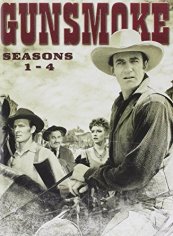

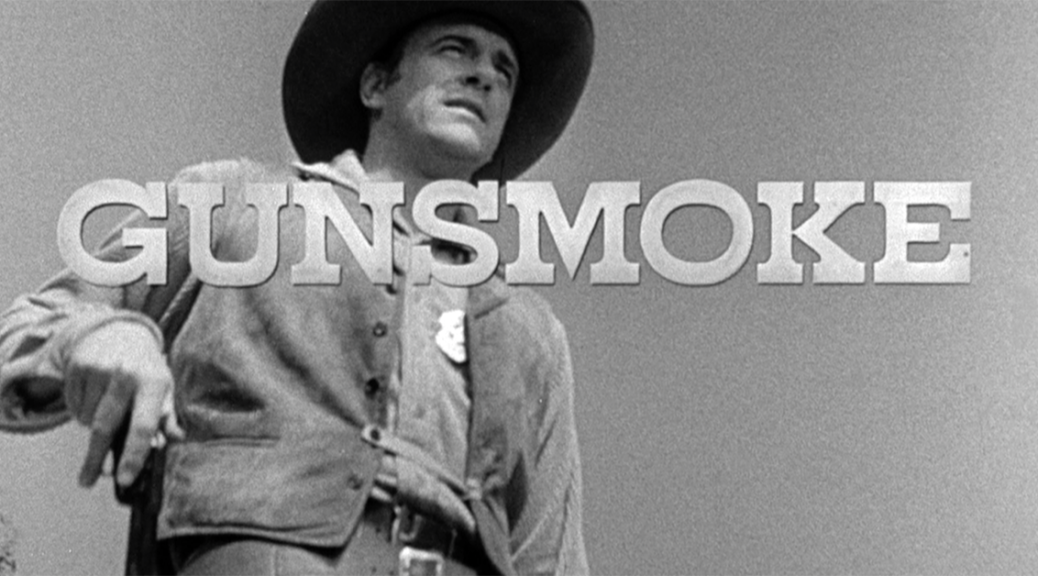

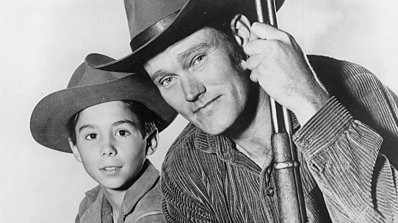 It was a pretty simple set-up that actually went deep with a lot of it’s stories. Lucas McCain was a widowed father raising his young boy in frontier New Mexico. After his wife died while they were living in Oklahoma, Lucas and his son relocated to the town of North Fork. When he arrived, McCain already had a reputation as a dangerous and deadly gunman, so the moniker of Rifleman was already acquired.
It was a pretty simple set-up that actually went deep with a lot of it’s stories. Lucas McCain was a widowed father raising his young boy in frontier New Mexico. After his wife died while they were living in Oklahoma, Lucas and his son relocated to the town of North Fork. When he arrived, McCain already had a reputation as a dangerous and deadly gunman, so the moniker of Rifleman was already acquired.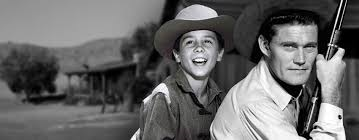

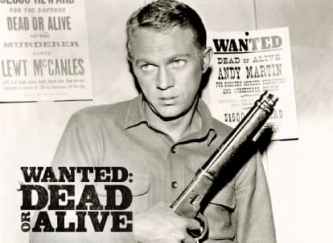 But it wasn’t just McQueen’s swagger, or his good looks as a gunman that made the show popular; there was a lot of credit due the ultra-cool rifle he had slapped against his leg. It was a Winchester Model 82 with a shortened barrel and stock called a Mare’s Leg. The lever was also oversized to a large oval, which increased the style factor when he needed to make a lifesaving defense against a desperate mark.
But it wasn’t just McQueen’s swagger, or his good looks as a gunman that made the show popular; there was a lot of credit due the ultra-cool rifle he had slapped against his leg. It was a Winchester Model 82 with a shortened barrel and stock called a Mare’s Leg. The lever was also oversized to a large oval, which increased the style factor when he needed to make a lifesaving defense against a desperate mark.